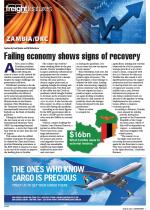Two years after the outbreak of the global Covid-19 pandemic, businesses are starting to pick up the pieces, turning what has been a massive challenge into meaningful change.At NAC2000, tackling the uncertainty has required a fresh outlook on the business which is in the process of developing a new strategy to deal with the impact of the pandemic and to take the company into the future.Speaking to Freight News, the ground handling company’s managing director Jonathan Lewis says the strategy is aimed at reconsolidating the business which was hard hit by Covid-19.“We are in the aviation business, an industry that was globally one of the most impacted by the coronavirus,” he explains. “At the beginning of the pandemic, we went from 180 f lights a week across our four stations to one a week. Business came to a near standstill.”While the recovery has been under way for some time, with airlines gradually returning to the air, cargo volumes are still not where they should be.“In the Zambian market we are seeing export volumes increase steadily, and the improvement is better than in the import sector which is still catching up. Our recovery has been good in terms of the number of f lights returning to and from Zambia, but we are still not seeing the cargo volumes that we need in both directions.”He said the biggest challenge in the market was still pricing, considering that freight rates had gone through the roof in the past two months. “Our capacity for exports is sufficient, but the rates are high, and coupled with the escalating fuel prices, it has been an extremely challenging time. The export of perishables has been particularly tough.”Zambia competes with South Africa for the European Union markets. “It is a tough market out there and we are seeing increasing competition on the side of markets such as Ethiopia and Kenya which are closer to the EU main market than us. Remaining competitive with the current freight prices is not easy.”According to Lewis, part of NAC2000’s new strategy is to expand its footprint and find new markets. “We are working closely with exporters in Zambia to develop new markets, particularly in the Middle and the Far East.”He said the company had used the time presented by the pandemic to develop itself internally to prepare for new business and to be ready when markets open up.“We have invested heavily in the training of our staff, as well as in equipment, as we ramped up our capacity and improved our efficiencies,” he says, highlighting that it became clear during the early days of the pandemic that economic recovery was not going to be fast.Making deliberate, significant investments into the business during this time was not easy but it has delivered a company with the necessary knowledge, skills, and capabilities needed in a post-Covid-19 environment.“This puts us in a stronger position to grab opportunities that come our way as the market continues to recover, especially in Zambia where we are at present seeing renewed investor confidence both from a local and international perspective.”

